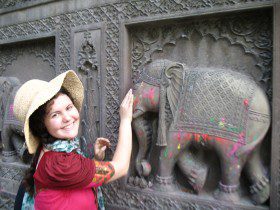Radhika Blinderman comes to Harvard after 13 years of Sanskrit study, and plans to analyze the most innovative figure in the philosophy of Indian language.
 While most children her age were content to learn nursery rhymes, Radhika Blinderman, PhD Candidate, Department of South Asian Studies, was learning Sanskrit shlokas and Indian classical music.
While most children her age were content to learn nursery rhymes, Radhika Blinderman, PhD Candidate, Department of South Asian Studies, was learning Sanskrit shlokas and Indian classical music.
Learning shlokas in a language she did not yet understand did not discourage her from developing a deep appreciation for Sanskrit. “I didn’t have a clue what it meant, but it just sounded so nice to me,” she says.
While a child growing up in India, Blinderman’s desire to study Sanskrit came when she “first became conscious about language,” at a very young age, and she continued to study the language, leading to a fascination with pre-colonial India. “It’s ancient India that fascinates me, and that I live in in my imagination,” she says.
After studying the language for 13 years and obtaining a Bachelor’s degree in Sanskrit in India, she has carried this passion to Harvard, where she is in her first year of the PhD program in South Asian Studies.
Blinderman has ambitious goals for her time at Harvard. She plans to use her language skills to examine pre-colonial linguistic theories from Varanasi. More specifically, she intends to study the work of 18th century scholar Nagesa Bhatta, who she explains as “the most innovative grammarian of all time, and the last one to exist.”
“I want to analyze, from the point of view of intellectual history, why he was the most innovative, and how tradition accepted him as his own, in spite of his innovative ideas, and later, rejected other intellectuals, for exactly the same reason – being bold and innovative,” she says. “I want to answer the question of why tradition accepts someone, and rejects others.”
Although dissertation research tends to be very specific, Blinderman says that it is important to always keep the big question in mind when diving in to the past: “I want to talk about this [question] not as a philosopher, and not as a linguist, but as a historian, and answer a big historical question, and I hope I will.”
Blinderman says that she plans to use more than just her language skills in her research – she will also use her background in studying the philosophy of language to construct her argument.
“I will have to read original text and translate them, and analyze them, but I will also have to use my skills as a grammarian I have acquired throughout the years in Varanasi, because to prove any idea, any historical truth that you want to present, you need to have a good amount of data,” she explains. “If you want to prove something to the traditional world, and make it sound plausible, you should be able to present ideas in a plausible way to them, not just to you or historians like you. You should be able to build an argument grammatically.”
Blinderman hopes her time at Harvard will inform her research on how these concepts have developed in both the Indian and Western worlds. In the short times since she has been in Cambridge, she has already been challenged and surprised by what she has learned.
Blinderman is enrolled in the South Asian Studies course ‘Modern India Through Narrative Forms,’ taught by Shankar Ramaswami, Lecturer in the Department of South Asian Studies and former SAI South Asian Studies Fellow. As someone who has “always retreated in to the past,” she says this course has been particularly challenging and rewarding as she studies modern India for the first time.
She is also currently taking classes in medieval Sanskrit logic, Sanskrit poetics (which she describes as “pure bliss” for a Sanskrit enthusiast like herself) and semantics. She hopes her study of philosophy, linguistics, and semantics will inform her research in innovative ways.
“I hope very much that I’ll be able to produce something meaningful during my years here,” Blinderman says.
– Meghan Smith
